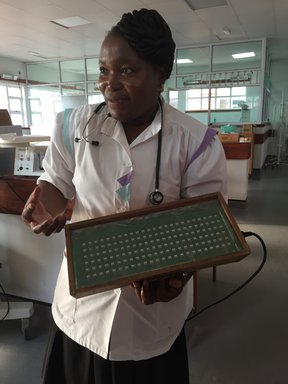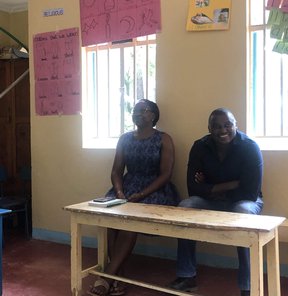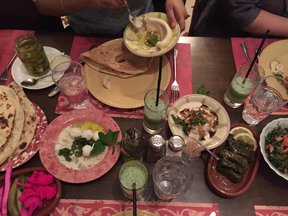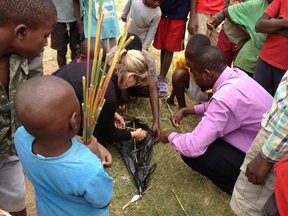Site visits are an opportunity to better understand the nuances of an organization, collaborative, or project in ways that we are unable to glean from reading proposals. We also recognize that site visits are stressful and time-consuming for the team and that it is not possible to showcase all critical aspects of the work. With these opportunities and limitations in mind, we have reflected on what makes for a good site visit.

Our Goals
- Gain a deeper understanding of the organization’s work and to understand its day-to-day challenges.
- Approach the site visit with an open mind and a learning spirit
- Build a respectful relationship and partnership with the larger team
- Identify current and future opportunities for the program
- Understand the barriers, risks, and challenges that can impact the program
- Deepen our understanding of the vision and goals of the program as well as the complexity of the context in which the team is working
- Reflect on opportunities for flexibility and adjustments in the workplan
Lever for Change strives for all site visits to adhere to our core values of openness, transparency, and value-add and we ask organizations to do the same. We believe that the more open, honest, and transparent organizations are, the more meaningful our engagement will be.

Credit: Kristen Molyneaux
What We Expect to Experience
- Program in Action: We like to observe the real work rather than a showcase that has been curated for us. To the extent possible, we would like to see what would happen if we were not around. If there are particular requirements or elements of a project that we want to see, we will inform the team ahead of time to ensure that is worked into the site visit agenda.
- Variation & Imperfection: We have deep experience in working with social change organizations, and we know it is not easy work—nor is it perfect. We do not expect organizations to have all the answers or have perfectly functioning projects at all times. We want you to show us what is working well and what is working less well. We can learn a lot by seeing the variations and imperfections within the project and understanding the approach to solving the challenges presented by those imperfections.

Credit: Kristen Molyneaux
- Interactions with Program, Field, and Evaluation Staff: Meeting with the leaders of an organization is wonderful and provides us an overview of the organization and its vision. However, we also want to meet with the key implementing staff that are on the front lines of ensuring the organization’s impact and vision are met. Traveling with staff to and from field sites and having less formal conversations over lunch/dinner provide great ways to learn. For us, these are opportunities to get to know the larger team and benefit from their insights about what's happening on the ground.
- Not Disruptive: We want to engage with the project/program in a way that is the least disruptive as possible. For example, we prefer that:
- participants are not required to wait at the offices or sites for long periods of time waiting for us to arrive
- regularly scheduled services such as school hours, clinic hours, etc. are not changed/canceled due to our visit
- adequate translation is provided, if needed, so that participants feel at ease speaking in their own language and we can make the most of the engagement

Credit: Kristen Molyneaux
- Costs: We cover costs of the site visit to the extent possible. This means paying for transportation to and from the sites, paying for meals and snacks, etc. Please let us know how we can best arrange to do this prior to our arrival.
What We Do NOT Expect to Experience
- To be showered with praise, attention, or gifts. If a team feels it would be inappropriate not to be thanked in some way, please let us know ahead of time. During site visits, we do not seek to be the center of attention; instead, we are there to learn, ask questions, and engage with stakeholders.
- Special Events. We do not expect, nor do we wish, for the program or community to plan a special event for our visit. We recognize that these events can often cost a great deal of time and are expensive for the community and the program, and it is not why we are there. We want this experience to be as low-key as possible so that we can focus on learning from each other and having genuine interactions with the staff and community.

Credit: Louis Mwewa
The Opportunity
- Learning. We hope the site visit provides an opportunity to reflect on questions that are raised and to learn together about what is working and where there may be challenges. Sometimes seeing the program through fresh eyes helps an organization to articulate its successes as well as the areas where they are still struggling to find their footing.
- Partnership. We’d like to be an equal participant in the site visit process. We will have questions and expect to receive questions about our thoughts, insights, and observations. We are there to learn—we are not looking for “gotcha” moments.
- Reflection. Invite us to reflect on current challenges. We have deep knowledge of the social sector and recognize the many hurdles organizations face on a daily basis. We know it may feel scary to admit flaws, but we recognize that those flaws are part and parcel of the work. Seeing organizations’ awareness of the challenges they face, reflections on how to adapt to meet those challenges, and commitment to continue a journey of learning is what gives us confidence in organizations’ work. We value organizations who take learning seriously.

Credit: Kristen Molyneaux
Before We Arrive
Please let us know of any expectations you have of us and any ground rules for our visit. For example:
- Is it ok to take photos during the visit?
- How should we respond to requests for contributions/gifts?
- When will we be expected to speak, if at all?
- Are there any questions it would be inappropriate for us to ask?
- Any cultural sensitivities we should be aware of particularly around clothing and attire?
- Any preference you have around reimbursement for site visit costs?
- Feel free to share pre-reading that would help us understand the context and details of what we will see.
- We would appreciate receiving an agenda in advance for the visit, including the names of sites and people we will meet.
Adapted from Why Site Visits Matter and What We Expect by our thoughtful colleague, Dana Schmidt, at Echidna Giving. Additional insights from Fredrick Mutinda, at Changing the Way We Care.